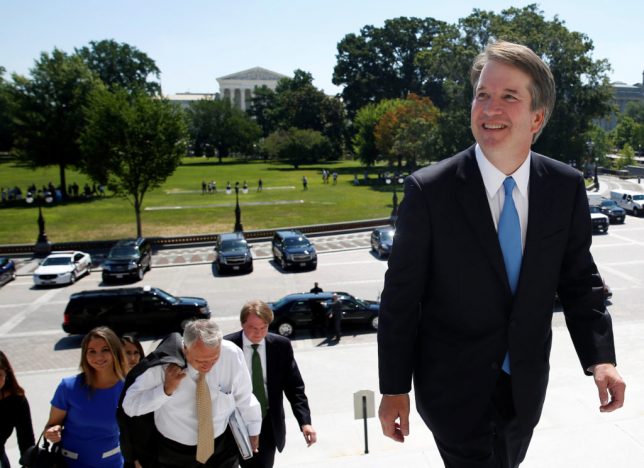Book Profile
Justice on Trial Features CRC Research
 Supreme Court nominee Judge Brett Kavanaugh arrives with U.S. Vice President Mike Pence at the U.S. Capitol in Washington, U.S., July 10, 2018. REUTERS/Joshua Roberts - RC173C260EC0
Supreme Court nominee Judge Brett Kavanaugh arrives with U.S. Vice President Mike Pence at the U.S. Capitol in Washington, U.S., July 10, 2018. REUTERS/Joshua Roberts - RC173C260EC0

In Justice on Trial: The Kavanaugh Confirmation and the Future of the Supreme Court, Mollie Hemingway and Carrie Severino recount the mass hysteria that gripped America’s judiciary during the 2018 Kavanaugh confirmation hearings, as liberal activists pulled out all the stops in order to prevent Justice Bret Kavanaugh from joining the United States Supreme Court.
Justice Kavanaugh is not the first Supreme Court nominee to face hurdles in his confirmation. Judge Robert Bork became the source of the term “borking,” when President Reagan nominated him to the Supreme Court in 1987. Activists viciously opposed his nomination and eventually succeeded in blocking him from the highest court in the land. Justice Clarence Thomas’s confirmation also involved a spontaneous allegation of sexual assault, leading to a hearing which he described as “Kafkaesque,” a reference to Franz Kafka’s work The Trial, in which an innocent man is sucked into a vortex of surreal mental torture by an opaque and infinitely complex bureaucracy.
But the intensity of the Kavanaugh confirmation hearings—notably the attempts to forego due process and the necessity for Kavanaugh to speak through right-leaning media outlets to counteract the left-leaning media’s reckless reporting—is without precedent. The authors rightly say at the end of their book that this event will likely damage our Supreme Court confirmation process for years to come and possibly deter great judges from seeking out positions as Justices, as Kavanaugh himself said in his opening statement.
Major activist groups on the Left, like National Abortion and Reproductive Rights Action League (NARAL) and the Center for American Progress wasted no time in opposing Kavanaugh, but some lesser-known organizations made even more noise.
In fact, these lesser-known organizations are a part of a larger network of left-wing special interest groups, fueled by anonymous wealthy donors. CRC pieced the connections together over time, and our research appears in Hemingway and Severino’s book.
What started our research team down the trail was the activity of an advocacy group known as Demand Justice, a project, they soon discovered, of the wealthy and powerful left-wing nonprofit Sixteen Thirty Fund. Demand Justice condemned the Supreme Court nominee even before Trump announced Kavanaugh. After Kavanaugh’s official nomination, Demand Justice began battling against Kavanaugh by attempting to find controversial material in Kavanaugh’s judicial record, funding ads calling for Kavanaugh’s resignation from teaching summer classes at George Mason University, and organizing protests against lawmakers after Kavanaugh was confirmed.
The for-profit PR firm, SKDKnickerbocker that represented Christine Blasey Ford, who accused Kavanaugh of sexual harassment, received $7 million from Sixteen Thirty Fund in 2017 according to their tax records. The protestors who interrupted the hearings and cornered fence-sitting former Senator Jeff Flake (R-AZ) in an elevator belonged to a group known as the Center for Popular Democracy, which receives money from New Venture Fund, a sister group of Sixteen Thirty Fund. Both funds are managed by their puppeteer, the shadowy left-wing consultancy company Arabella Advisors, about which CRC’s Hayden Ludwig wrote a full-length investigative report. The four groups Arabella manages, including Sixteen Thirty Fund and the New Venture Fund, brought in more than $1.6 billion between 2013 and 2017.
Politicians like Senator Sheldon Whitehouse (D-RI) joined the fray too. He hurled the term “dark money” at Kavanaugh during the hearings because Kavanaugh enjoys support from the Federalist Society, a nonprofit organization of conservative and libertarian judges and lawyers. While Kavanaugh had the Federalist Society on his side, it has only one-sixteenth of the revenue of Arabella, according to Federalist Society’s tax records and InfluenceWatch.
But Hemingway and Severino also cover the human side of the story well, using choice anecdotes to illustrate what it was like behind the scenes. From Kavanaugh’s team working overtime at the office and ordering in pizza during the nomination process, to Judge Kavanaugh’s family maintaining their promise to organize the neighborhood’s block party despite stalking members of the press, the authors provoke the reader’s sympathy and admiration for those who were intimately invested in Kavanaugh’s success.
The most powerful part of the book was a single page that told the horrific stories of two women to subtly counter the narrative that those involved in the defense of Kavanaugh were nothing but misogynists.
The authors first wrote about one of the staffers of the moderate Senator Susan Collins (R-ME), who experienced massive pressure from her Democratic colleagues and the legacy media to vote against Kavanaugh. In the end, Collins ignored them, and voted to confirm Kavanaugh. One of Collins’ staffers, a 25-year-old female doing constituent work in her Maine office, received a vulgar phone call from an unidentified man who wished she would get raped and impregnated for being complicit in Collins’ vote. The shaken staffer quit due to the dreadful anxiety the call gave her.
The second story was about former Trump campaign manager and spokeswoman Kellyanne Conway who stated on CNN that she herself had been a victim of sexual assault, leaving interviewer Jake Tapper shocked. Conway added that despite being a victim, she refuses to blame Tapper, Kavanaugh, or all men in general for it.
Justice on Trial is a strong defense of Kavanaugh, conservative and federalist principles, and the rule of law in the face of bad-faith and purely partisan attempts to undermine the American judiciary.



